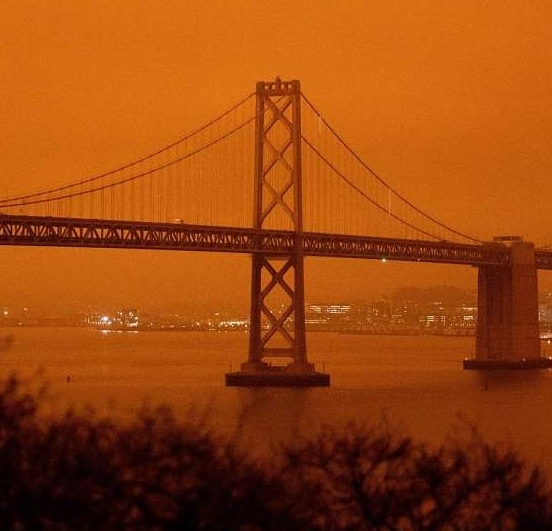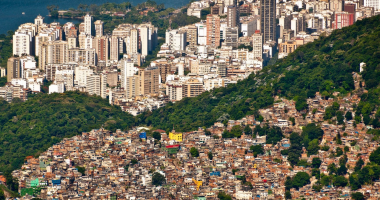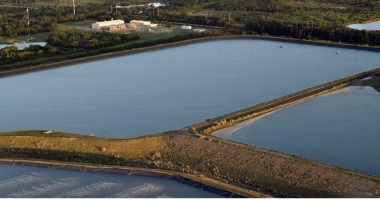Climate, Health and Equity Brief
Apocalyptic skies, climate deaths and mass displacement
September 14, 2020

The Climate, Health & Equity Brief is GMMB’s take on the week’s news on the current impacts of climate change. If you haven’t subscribed yet, you can do so by clicking here.
Hot Topic: Apocalypse now. The U.S. West Coast is on fire, with wildfires continuing to rage and massive devastation spreading across multiple states. More land has now burned in California than in any point in history, hundreds of thousands of acres have fallen victim in Washington state, and fires have forced a staggering 10 percent of all residents in Oregon to evacuate their homes.
Beyond wildfires, two new studies show just how widespread and deadly climate impacts are. In an analysis of 2012 deaths in the EU, the European Environment Agency found that 13 percent of fatalities—or one in eight—were due to negative environmental factors like air pollution, poor water quality and exposure to toxic chemicals. And between 1970 and 2016, the World Wildlife Fund found that global biodiversity declined by 68 percent, with habitat degradation, pollution and climate change among the top five drivers behind this staggering loss.
Looking ahead, two additional reports give insight into how much worse the climate crisis could get in the near future. One report names climate change a significant risk to the stability of U.S. financial systems as the exorbitant costs of extreme weather spread to mortgage and insurance companies and limit consumer access to credit and insurance. The second warns that if global greenhouse gas emissions continue at the same pace, extreme weather, water scarcity and food shortages could displace 1.2 billion people by 2050.
Despite all of this, the Trump Administration continues its assault on the environment, proposing a new rule that would open more than 6,000 acres of Alaskan Tongass National Forest to logging. The forest’s exploitation is certain to cripple local wildlife populations and shrink a vital carbon sink at a time when the planet and its inhabitants need them more than ever.
—Matt & Traci, GMMB
Health
A recent report out of the EU revealed that in 2012, 13 percent of deaths in Europe were attributable to environmental factors including air pollution, poor water quality and exposure to toxic chemicals. (BBC News)
More than 70 major wildfires are now burning across the Western U.S., with a record 2.2 million acres burned in California, an unprecedented 10 percent of Oregon’s population ordered to evacuate and more than 330,000 acres burned in just 24 hours in Washington state this week. (The Washington Post, San Francisco Chronicle, AP News, NBC News)
A recent report warns that extreme weather as well as water and food shortages fueled by the climate crisis could displace up to 1.2 billion peopleliving in 31 countries by 2050. (The Guardian)
A second record-breaking heatwave that reached 121°F in some parts of California this week intensified existing fire conditions in the state while unseasonal extreme heat in Colorado drove temperatures to 100°F just 48 hours before the state’s earliest ever snowfall on Tuesday. (The Washington Post, NPR)
Japan and the Korean Peninsula are reeling from two major typhoons in less than a week, with torrential rainfall and heavy winds destroying at least 1,000 homes and leaving more than 270,000 without power. (CNN)
A new report found that global biodiversity fell by an average of 68 percent between 1970 and 2016, with habitat destruction, pollution and climate change among the top five drivers of loss. (Our Daily Planet)
Equity
Politics & Economy
A new proposal from the Trump Administration would open more than 6,000 acres of Alaska’s carbon-storing Tongass National Forest to logging, threatening to harm indigenous communities and wildlife habitats. (The Hill)
In a political attempt to recast his environmental record for voters in the swing state of Florida ahead of the election, Mr. Trump endorsed an existing 10-year moratorium on oil and gas drilling off the coast of Florida just two years after his administration moved to end it. (The New York Times)
A new federal report warns that climate change poses a major risk to the U.S. financial system as the cost of extreme weather events spread to financial institutions including insurance and mortgage companies. (The New York Times)
Action
Poland, one of the EU’s largest coal-producing countries, has announced a $75 billion investment in wind and nuclear energy to phase out coal and limit its share in electricity production to 28 percent by 2040. (Reuters)
Ahead of the election, the Sunrise Movement has set a goal to send 100,000 postcards to youth in key swing states to get them ready to vote. Join in on the action and help send out 100 postcards here!
Kicker
Dense haze from California wildfires blotted out the sun and caused apocalyptic orange skies in the Bay Area this week. Check out this photo series to see what it looked like.
“It’s really shocking to see the number of fast-moving, extremely large and destructive fires simultaneously burning. There’s certainly been nothing in living memory on this scale.”
– UCLA climate scientist Daniel Swain

)





